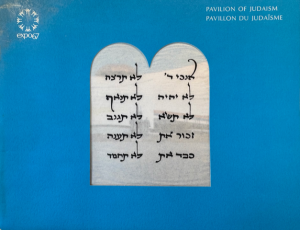 MONTREAL — He never met his namesake grandfather, who remains a revered historical figure in Israel and throughout the Jewish world.
MONTREAL — He never met his namesake grandfather, who remains a revered historical figure in Israel and throughout the Jewish world.
Rabbi Eliezer Ben-Yehuda speaks about his famous grandfather to residents of Le Waldorf seniors residence.
But for Rabbi Eliezer Ben-Yehuda, grandson of Eliezer Ben-Yehuda, the journalist and lexicographer who transformed biblical Hebrew into the modern, dynamic lingua franca of the Jewish people in the Jewish state, the legacy of his saba is that of a true visionary.
“It was his vision for Jews to reclaim their country in their own language,” Rabbi Ben-Yehuda, 71, said at a talk at Le Waldorf seniors residence, one of several he delivered while he was in Montreal recently. “And it had to be Hebrew, because Hebrew was a compromise.”
What Rabbi Ben-Yehuda meant, he told his audience, was that his grandfather, a Lithuanian Jew who was born with the family name Perlman and moved to Turkish-ruled Palestine in 1881, knew that neither Yiddish nor any of the other languages or dialects spoken by the Jews of Palestine would do.
“The Jews needed to use the same language to build a country, and to fight our enemies and to win,” Rabbi Ben-Yehuda said.
He noted that his grandfather almost single-handedly accomplished this by making Hebrew the spoken language of the region’s Jewish people. It was a great unifying force for them, and by extension for Israel once it became a country.
“No other man could have done it,” Rabbi Ben-Yehuda said.
A natural polyglot, Ben-Yehuda attended yeshiva and he became expert both in Hebrew’s biblical and more secular forms, as well as fluent in Russian, German and French after he went to Paris to study at the Sorbonne.
Once he arrived in Palestine, Ben-Yehuda became determined to revive Hebrew, in order for the Jewish People to see the “resurrection of its land and language,” Rabbi Ben-Yehuda said.
His grandfather treated it almost as a calling from God, he added.
Some Jews – including the most observant ones – considered it blasphemous to make Hebrew, the holy language of the Torah, the spoken language of everyday life, and they wanted to excommunicate Ben-Yehuda, his grandson said.
Yet Ben-Yehuda was resolute, refusing to speak any other language at home with his wife or children.
Little by little, modern Hebrew evolved.
“This little man who was hungry every day for food started the ball rolling, creating institutions,” Rabbi Ben-Yehuda said.”
It was Ben-Yehuda, his grandson said, who set up the Committee for the Hebrew Language (now an academy) and who wrote the first modern Hebrew dictionary.
Ben-Yehuda died of tuberculosis, which he had originally contracted in Paris, at age 64, and his funeral on Jerusalem’s Mount of Olives was attended by 30,000 people.
Rabbi Ben-Yehuda is the son of one of Eliezer Ben-Yehuda’s sons, Ehud.
In 1959, Ehud and his mother, Ben-Yehuda’s second wife, Hemda (the younger sister of his first wife, Deborah, who also died of tuberculosis), completed the 16-volume Hebrew-language dictionary begun by Ben-Yehuda himself.
Rabbi Ben-Yehuda said his grandmother, Hemda, often used to tell him anecdotes about his grandfather.
Rabbi Ben-Yehuda, who once attended McGill University and eventually became a pulpit rabbi in Florida until his retirement in 2008, even wrote a book about his famous grandfather, entitled Fulfillment of Prophecy.
“‘You should be like your grandfather,’ my grandmother used to tell me as a child,” Rabbi Ben-Yehuda said. “I’ve been telling his story ever since.”
Rabbi Ben-Yehuda, who visited Montreal as a guest of Canadian Magen David Adom for Israel, also spoke at the Congregation Tifereth Beth David Jerusalem and to students at Solomon Schechter Academy and Herzliah High School.






